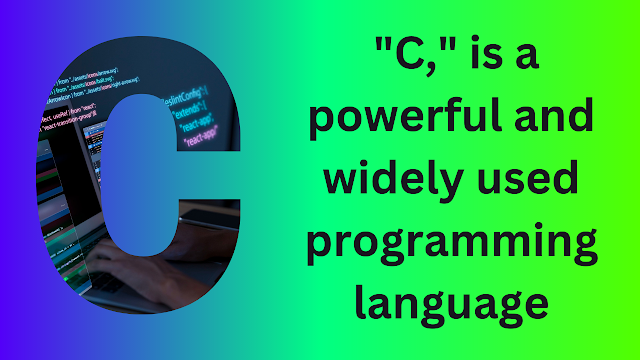What is C Language
C Language. Hello students of the toper skills, In this article I'll be explaining you about C Language, Let's journey into the world of programming languages and discover the timeless charm of the C language. Created back in the 1970s by Dennis Ritchie at Bell Labs, C has become a superstar in the world of computers, sticking around for decades and still going strong today.
- C programming language
- Variables
- Data types
- Functions
- Pointers
- Arrays
- Control structures
- Loops
- Conditional statements
- Operators
- Memory management
- File handling
- Preprocessor directives
- Structs
- Dynamic memory allocation
- Recursion
- Header files
- Bitwise operations
- Input/output operations
- Error handling
Dennis Ritchie
What makes C so special?
Well, it's like a superhero with a secret power of simplicity. Even though its rules are easy to understand, it packs a punch when it comes to writing programs that are fast and can work on different types of computers.
One cool thing about C is that it lets programmers play with the inner workings of computers. With tools like pointers, which are like magic arrows pointing to specific spots in the computer's memory, and memory management, programmers can control how their programs use resources.
Despite the arrival of shiny new programming languages, C remains a favorite among developers. It's like the backbone of many important computer systems, such as operating systems like Unix. This means that learning C opens up lots of exciting job opportunities in fields like software engineering and cybersecurity.
So, why should you care about C? Well, learning C is like getting a backstage pass to the inner workings of computers. It's a powerful tool that gives you a deeper understanding of how things work in the digital world. And as technology keeps evolving, C will be there, ready to help us build the future, one line of code at a time.
What is C Language?
C Language, also known simply as "C," is a powerful and widely used programming language that was originally developed in the early 1970s by Dennis Ritchie at Bell Labs. It is renowned for its efficiency, flexibility, and portability, making it a popular choice for system software, application software, and even hardware development.
As a procedural programming language, C follows a structured approach to writing code, emphasizing step-by-step procedures or routines to accomplish tasks. Its syntax is relatively simple and straightforward, yet it provides low-level access to system resources, which allows for fine-grained control over computer hardware.
C has had a profound impact on the field of computer science and software engineering. Many modern programming languages, such as C++, Java, and Python, have borrowed concepts or syntax from C. Additionally, the Unix operating system and its derivatives, such as Linux and macOS, are largely written in C, further solidifying its importance in the computing world.
Some key features of C language include:
Portability:
C code can be compiled and executed on different platforms with minimal modifications, making it highly portable.
Efficiency:
C programs typically run fast and consume less memory due to its close-to-hardware nature and lack of overhead.
Flexibility:
C provides a wide range of data types, operators, and control structures, giving programmers the flexibility to implement various algorithms and data structures.
Extensibility:
C supports the creation of reusable libraries and modules, allowing for the development of large-scale, modular software systems.
Direct Memory Manipulation:
C allows direct manipulation of memory through pointers, enabling efficient memory management and access to hardware resources.
Why to learn C Language?
Learning the C language offers several compelling reasons:
Foundation for Programming:
C is often considered a foundational language in computer science and programming. Understanding its concepts provides a solid basis for learning other languages.
Efficiency and Performance:
C allows for low-level manipulation of computer resources, resulting in highly efficient and performant code. It's a language of choice for system programming, embedded systems, and performance-critical applications.
Portability:
C code can be easily ported across different platforms with minimal modifications, making it a versatile choice for cross-platform development.
Understanding Computer Architecture:
Since C provides direct access to memory and hardware, learning it helps in understanding the underlying architecture of computers and how software interacts with hardware.
Access to System Libraries: Many system libraries and operating systems are written in C. Knowing C allows you to work closely with these libraries, providing deeper control and understanding of system-level operations.
Career Opportunities:
Proficiency in C opens up various career opportunities, especially in fields like system programming, embedded systems, game development, and operating system development.
Learning Pointers and Memory Management: C's use of pointers and manual memory management teaches important concepts about memory allocation, deallocation, and memory manipulation, which are applicable in many other programming languages.
Flexibility and Control:
C provides a high level of control over program execution and memory usage, allowing developers to optimize their code for specific requirements.
Compatibility with Legacy Systems:
Many legacy systems and applications are written in C. Learning C enables you to maintain and extend these systems, ensuring their continued functionality and relevance.
I hope you like this article. if yes share this article to your friends and follow me on my YouTube channel @officialmypcskills and connected with this blog. Thanks for visiting.


Post a Comment